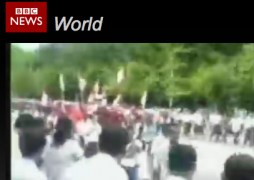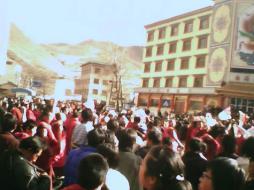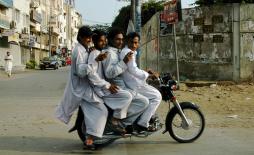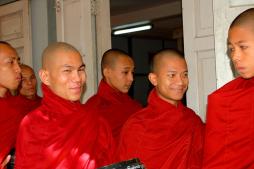protests
Posted by KatrinVerclas on Sep 28, 2007
The Myanmar military continued to suppress demonstrations in Burma/Myanmar today with harrowing pictures of tear gas, guns, and beatings directed at the monks and many more civilian protesters, estimated at 70,000 people. We wrote earlier about the use of mobile phones in transmitting information. The BBC today has an update on the use of the Internet in getting information out of Burma, as the country is called by democracy supporters and dissidents. The article notes that mobiles were used to get information out of the country, but also as a tool by the military junta to disseminate rumors and false information. This is something that we have seen elsewhere - mobiles as a disruptive rumor and propaganda mill -- most recently in Sierra Leone.
Posted by MohiniBhavsar on Sep 16, 2010
The Role of Digital Networked Technologies in the Ukrainian Orange Revolution data sheet 1984 Views
Abstract:
This working paper is part of a series examining how the Internet influences democracy. This report is a narrative case study that examines the role of the Internet and mobile phones during Ukraine's 2004 Orange Revolution. The first section describes the online citizen journalists who reported many stories left untouched by "self-censored" mainstream journalists. The second section investigates the use of digital networked technologies by pro-democracy organizers. This case study concludes with the statement that the Internet and mobile phones made a wide range of activities easier, however the Orange Revolution was largely made possible by savvy activists and journalists wililng to take risks to improve their country.
Posted by KatrinVerclas on Mar 16, 2008
Pictures and video out of Lhasa and Xiahe are slowly emerging, yet again initially mainly taken with camera phones and transmitted clandestinely across the border to transmit to a global audience.
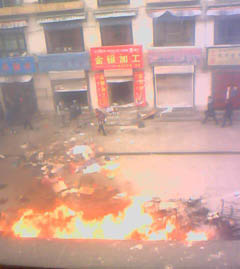
According to reports, mobile networks and Internet access have been restricted for the last few days. Anti-Chinese protests led by Buddhist monks spread to other cities after a violent crackdown by Chinese troups on Friday that may have left as many as 100 protesters dead. Protests began peacefully last Monday but turned violent yesterday. Human Rights Watch alleged Chinese security forces "beating protesters, firing live ammunition and surrounding the Ganden Drepung and Sera monasteries."
Tibet has been occupied by China since 1950.
Update: From Chinese Twitter clones, comments about Tibet.
Images courtesy of Tibetan Center for Human Rights
Posted by CorinneRamey on Nov 12, 2007
Bloggers, activists and organizers in Pakistan are using SMS - short test messages - to coordinate protests and send updates on the political situation since Pakistani President Pervez Musharraf imposed martial law on November 3. Only 12% of Pakistanis have access to the internet and therefore mobile phones are a particularly useful communication tool in the current media blackout, imposed since emergency rule was imposed. Bloggers in Pakistan report that November 3 had the "highest number" of SMS messages sent -- an average of about 10 per mobile phone.
Posted by CorinneRamey on Sep 25, 2007
Thousands of monks have taken to the streets in Myanmar within the past month in pro-democracy demonstrations. Today the Burmese government threatened the monks with legal action.
The government has shut down mobile phone service to pro-democracy supporters, activists, and some foreign journalists, writes the Agence France-Presse. A journalist and photographer from the AFP are among those who have lost phone service, and the agency has requested that Myanmar restore service to the journalists. The National League for Democracy also reports that its landline phone has been cut off, according to this article in The Economic Times.
Posted by KatrinVerclas on Feb 14, 2006
Fury over Danish cartoons - A cell phone is held aloft as protesters angry over caricatures of Muhammad burn Danish and U.S. flags in Amman, Jordan. Digital communication has become a lifeline for protest organizers. (Photo by Ali Jarekji -- Reuters - published on the The Washington Post). [via textually.org]
